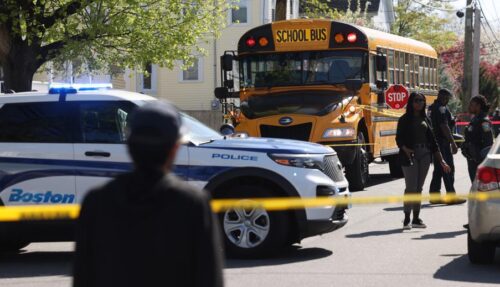The Supreme Court decision allowing President Trump to end a form of legal protection for immigrants who fled four nations mired by instability has generated new fears of imminent deportations among recent arrivals to Massachusetts.
On Friday, the court issued a ruling that lets the Trump administration proceed with plans to end a humanitarian parole program for immigrants from Cuba, Haiti, Nicaragua, and Venezuela. The program, known as CHNV, has granted temporary legal status to more than a half-million people from those nations.
“Our clients are worried and we’re worried,’’ Jeff Thielman, chief executive of the International Institute of New England, a social service agency that resettles immigrants and refugees, said Saturday. “The state right now is mass confusion and concern.’’
The court ruled on a request from the Trump administration to stay a lower-court decision that temporarily halted plans to end the humanitarian parole programs. The proceedings originated from a lawsuit filed in federal court in Boston, which seeks to reinstate the temporary protections that Trump ended after he returned to office in January.
The Trump administration planned to end the program on April 24, but a ruling from US District Judge Indira Talwani temporarily put the move on hold. The Supreme Court’s decision undid that action and exposed people with those temporary protections to deportation while the legal proceedings continue.
The programs, known as humanitarian parole, date back to the 1950s, when a law granted the attorney general discretion to admit noncitizens from countries affected by gang violence, war, or other political instability. President Trump has targeted the system as part of his wider crackdown on legal immigration.
Two justices appointed by Democratic presidents, Ketanji Brown Jackson and Sonia Sotomayor, publicly dissented, saying that the Trump administration hadn’t demonstrated that the program must end immediately to avoid irreparable harm. The City of Boston had also weighed in, submitting a brief alongside more than 30 cities, counties, and public officials nationwide that urged the court to let Talwani’s order stand.
On Saturday, Mayor Michelle Wu said the city remains “steadfast’’ in its commitment to being safe, welcoming, and “creating opportunity for all.’’
“It’s not despite our immigrant heritage that we are strong, it is because of our immigrant heritage and the diversity of all of Boston,’’ she told reporters at Harambee Park, speaking at a an unveiling of Caribbean flags. Wu’s office provided the Globe with an audio recording of her remarks.
US Department of Homeland Security Assistant Secretary Tricia McLaughlin praised the high court’s decision on Friday in a statement that called the CHNV program “disastrous.’’
“Ending the CHNV parole programs, as well as the paroles of those who exploited it, will be a necessary return to common-sense policies, a return to public safety, and a return to America First,’’ she said.
Thielman said in the last two years, the institute has helped about 15,000 people from Haiti enroll in federal benefits, about half of whom were granted legal status through the CHNV program. The agency also enrolled 1,500 to 1,800 Haitians with the legal protections in employment services to help them find work, he said. Many Haitians have left the country to flee gang violence, political turmoil, poverty, and fallout from natural disasters, including a devastating earthquake in 2010.
Tilda, a 42-year-old Haitian woman living in Brockton, said she came to Massachusetts under the program in 2023. She asked to be identified by her nickname because she fears retaliation from federal immigration authorities.
With her humanitarian parolee status, Tilda said she was granted authorization to work, found a job with a plastic appliances manufacturer, and became certified as a home health aide.
“I liked it, because I found a job,’’ she said through a Haitian Creole interpreter during an interview in April. “I was living a better life.’’
Returning to Haiti is not an option, she said. Her father falls asleep amid the sound of gunfire outside his home in Port-au-Prince, she said. Tilda previously attempted to establish a new life in Brazil, but said she couldn’t find steady work and then moved to the United States.
“It’s very difficult because if you go back to Haiti, you risk your life,’’ Tilda said.
One plaintiff in the lawsuit seeking to reinstate the program is Wilhen Pierre Victor, a Woburn resident who sponsored family members to enter the United States from Haiti with humanitarian parole.
Victor’s brother and his family relocated to Woburn last year, and have found work, but applications filed by her niece and cousin weren’t processed before Trump ended the program, the complaint said. Now the niece and cousin are stuck in Haiti and Victor’s brother fears he and his family won’t be able to stay here.
Without humanitarian parole, noncitizens can seek authority to stay in the country legally by applying for asylum or temporary protected status, Thielman said.
Yet, the temporary protected status program is also under attack. On May 19, the Supreme Court let the Trump administration withdraw those protections from about 350,000 people from Venezuela. The federal government plans to end the program for Haitians in August.
Willian came to the United States from Venezuela two years ago with temporary protected status and works as a delivery driver for Amazon. He asked to be identified only by his first name because he too fears retaliation.
Willian said Venezuelans who fled here are seen as enemies by Nicolás Maduro, leader of the South American nation.
“Even if we don’t commit a crime, even if we don’t do anything wrong, they could put us in jail,’’ Willian said in Spanish as Thielman translated his remarks into English.
Marvin Mathelier, executive director of the Toussaint Louverture Cultural Center in Boston, said Haitians must sell all their belongings to pay to leave the country. If they are forced to return, they face nothing but danger, he said.
“I think this is cruel,’’ said Mathelier, whose parents moved to the United States from Haiti in the 1980s. “We are just throwing them back to the wolves and that’s just very unfortunate.’’

